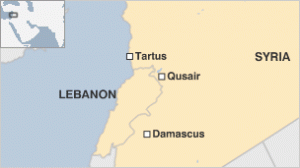 Syrian government forces have surrounded the rebel stronghold of Qusair and are storming it from several directions, says Syrian state TV.
Syrian government forces have surrounded the rebel stronghold of Qusair and are storming it from several directions, says Syrian state TV.
Fighting has gone on around the town, near the Lebanese border, for weeks.
Opposition groups say militants from the Lebanese Hezbollah movement are fighting alongside government forces.
Correspondents say Qusair has strategic value for both sides. If the government retakes it, it would ensure access from the capital to the coast.
Russia, a key ally of Syria’s President Bashar al-Assad, has a small naval maintenance facility at the Syrian deep-water port of Tartus.
News of the assault on Qusair came as Mr Assad vowed to continue the “fight against terrorism”.
Lebanese links
For the rebels, control of Qusair means they can come and go from neighbouring Lebanon, says the BBC’s Jim Muir, in Beirut.
There are also reports that hundreds of Lebanese Sunni militants have joined the fight on the rebels’ side, our correspondent says.
Syrian opposition activists said government air strikes and heavy shelling on Sunday had killed at least 16 people in Qusair so far.
Both sides in the conflict describe fierce hostilities around Qusair, where rebels have been under siege for weeks.
In his first interview since the US and Russia announced plans for a peace conference, Mr Assad told an Argentine newspaper that the meeting should focus on stopping the flow of money and weapons to “terrorists”.
He rejected suggestions he might stand down, saying a captain did not abandon his ship and presidential elections next year would determine his future.
The conference, scheduled for June, will try to persuade the Syrian government and opposition to accept a deal, including an immediate cessation of violence.
The plan, based on a UN-backed proposal, would see the establishment of a transitional government that could include officials serving under President Assad and members of the opposition.
However, neither the Syrian government nor the opposition has yet made a commitment to attend the meeting.
The top US general described Russia’s decision to send missiles to Syria as “ill-timed and unfortunate”.
Gen Martin Dempsey, chairman of the Joint Chiefs of Staff, said the shipment would “embolden the regime and prolong the suffering”.
Without confirming the shipment, Russia’s Foreign Minister Sergei Lavrov said the supply of missiles to Syria did not break any international rules.
Last week, the BBC’s Ian Pannell was shown video and eyewitness testimony that appear to corroborate allegations of chemical weapons’ use in the Syrian town of Saraqeb.
Turkey has given US President Barack Obama what it says is evidence of chemical weapons use in Syria.
The US had warned that such a development would be a “red line” for possible intervention.
But Mr Obama said more specific details were needed about alleged chemical attacks.
Russia has consistently opposed any international intervention in Syria, along the lines of the Libyan conflict in 2011.
The UN said last week that the death toll in Syria had reached at least 80,000 since the conflict began in March 2011. Activists said the number could be as high as 120,000.
BBC

Leave a Reply
You must be logged in to post a comment.